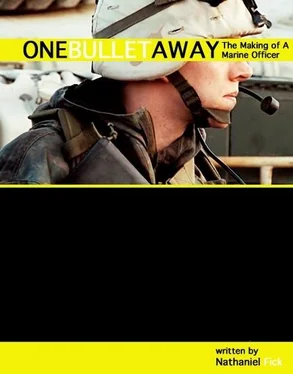I screwed it up from the first note. My lefts were rights, my rights were lefts, and the tempo surged and sagged. The platoon worked not to expose me, but it was too confusing. They collapsed into a pitter-patter of mismatched heels, like a group of tourists out for a morning stroll. Olds lit into me.
“Daggone it, candidate. You know what happens to lieutenants who can’t even march a platoon?”
I croaked, “No, Sergeant Instructor Sergeant Olds.”
“They get their Marines killed in combat.” This fate, at OCS, was promised not only to candidates who couldn’t march but also to those who failed to blacken their boots, polish their brass belt buckles, or put on their socks quickly enough. “You want to get your Marines killed?”
“No, Sergeant Olds.” I realized my mistake the second it left my lips.
Olds shrieked, “What did you call me? You think we’re drinking buddies? You want to date my sister?”
“No, Sergeant Instructor Sergeant Olds,” I yelled as loudly as I could.
“Candidate, I think you’re a soft one.” Olds dropped his voice to a low snarl and put his face inches from mine. “And I run the soft ones out before they can get Marines killed. You just remember that.”
Olds rattled me. I slunk back into the platoon, where my buddies whispered encouragement, saying everyone got his day in the sun. But I was nervous. I wanted to be there, and I tried hard. For the first time in my life, desire and effort wouldn’t be enough. I was learning that in the Marines, the only easy day was yesterday. Success the day before meant nothing, and tomorrow might never happen. I woke up each morning at Quantico wondering whether I’d still be there that night.
The candidate chow hall was in a low-slung building on the banks of the Potomac River, across a set of railroad tracks from our squad bay and the parade deck. We crossed the tracks on a footbridge, winding up and down the ramps twice for each meal, three times a day. Three hundred seventy-eight crossings during the course of the summer. OCS didn’t allow candidates to wear wristwatches, and wall clocks were intentionally few. We measured time from meal to meal.
I shuffled through the food line holding my tray in front of me and parallel to the ground, elbows bent ninety degrees, thumbs and forefingers touching in small circles. Sergeant Olds demanded this posture because it mimicked the way we held our rifles at shoulder arms while marching. Those with the best muscle memory, he said, will graduate. Those without can join the Army. A gauntlet of screaming instructors lined the path from the chow line to the tables. After my ass-chewing on the parade deck, I was desperate to avoid being singled out. I ducked my head and plunged through, not wanting to waste my precious meal time at the position of attention listening to a spittle-laced lecture on the virtues of endurance or loyalty. The harassment, I suspected, wasn’t random. The staff pulled candidates they thought needed punishment or a challenge. Apparently, I’d had my dose for the morning because I slipped among the tables untouched.
I sat at a Formica table with my back straight and my heels together at a perfect forty-five-degree angle. The genteel posture was a façade. There were no manners here, no conversations with tablemates. I shoveled food into my mouth, dripping flecks of syrup and gravy down my camouflage blouse. My mission for the next three or four minutes was to consume enough calories for my body to recover from the log run and make it through the morning.
Classes filled most of each day between morning PT and evening drill practice on the parade deck. We marched to the classrooms, usually Quonset huts or converted aircraft hangars, and filed silently down the rows of tables. We couldn’t sit until Olds gave the command. When the whole platoon stood at attention by its chairs, Olds would roar, “Ready. Seats!”
“Kill!” we shouted in response. It was an early step toward acclimating us to violence. We had one second to drop into our chairs, or else we’d stand and do it again. Each candidate carried a binder filled with loose-leaf paper and outlines of the classes. The instructors were mostly officers, captains and first lieutenants, and they stuck to the Marine Corps’s formulaic teaching method. We memorized the names and dates of famous battles and the exploits of renowned Marines. We learned the fourteen leadership traits, the eight principles of camouflage, and the six battlefield disciplines.
The curriculum seemed ridiculous at first. My liberal arts education had valued discussion, debate, and nuanced interpretations of complex ideas. But in combat, we were told, there’s rarely time for discussion and debate. Complex ideas must be made simple, or they’ll remain ideas and never be put into action. The leadership traits were bearing, courage, decisiveness, dependability, endurance, enthusiasm, initiative, integrity, judgment, justice, knowledge, loyalty, tact, and unselfishness. We drilled them, and every other list, over and over again. I memorized them in the classroom, in line at the chow hall, and in my rack at night. The purpose, we were promised, was to make them instinctive. They would become innate to our decision-making process and infuse everything we did without even a conscious thought.
One of the captains stood at the front of the classroom and read a quote from T. E. Lawrence, leader of the Arab revolt against the Turks in World War I. “Nine-tenths of tactics are certain, and taught in books: but the irrational tenth is like the kingfisher flashing across the pool and that is the test of generals. It can only be ensured by instinct, sharpened by thought practicing the stroke so often that at the crisis it is as natural as a reflex.” He said we would be taught one tenth at OCS and another five or six tenths at The Basic School (TBS). If we were lucky, we’d pick up an additional one or two tenths in our first platoons. The final tenth could be learned only in combat. That tenth, for us, seemed impossibly remote.
During the first three weeks, I slept in five different racks, since we continually shifted to fill the gaps left by dropped candidates. Their transgressions varied. Two fell out of three runs in a row. “Not physically qualified.” Another couldn’t grasp the concepts in our written work. “Academic failure.” They were kicked out, taunted by the staff as they emptied their footlockers, and then ridiculed after they had gone. The fourth, though, was treated more solemnly.
Candidate Dunkin had been struggling since the first week when Olds had singled him out as an individual. The accusation proved true. I was learning that the staff valued enthusiasm and loyalty above all else. They wanted candidates with heart who could work as a team. A struggling candidate could redeem himself by trying harder, wringing performance from effort. Dunkin chose a different course.
Dietary supplements were strictly forbidden. We drank water, not Gatorade, and ate chow hall food, not laboratory-engineered performance bars. Every candidate was warned that being caught with a supplement of any kind would be an honor violation, meaning instant dismissal from the course.
As we toed the line one evening, ready for taps, the staff announced a footlocker inspection. Hidden in Dunkin’s shoeshine kit was a bottle of ephedrine. He stood there, blubbering, as Staff Sergeant Carpenter calmly told him to pack his bag and go stand in the hallway. No screaming or theatrics, just a stern dismissal, a clear statement that he was not Marine officer material. The platoon stood at attention, watching in silence as he packed. No one said a word as he shouldered his seabag and walked between the rows of racks.
Dunkin had broken the cardinal rule — the bond of trust between leaders and led. The leadership traits were more than a list to memorize for a test. Dependability. Integrity. Judgment. That evening, I understood for the first time the relationship between the sergeant instructors and the officer candidates: learn to obey before you command. For ten weeks, the staff owned us. They could yell and scream, make us put on and take off our socks fifteen times each morning, and harass us from reveille to taps. But after commissioning, the authority would shift. The candidates would become lieutenants, then captains and colonels. They would be the commanders leading enlisted Marines in battle. The staff had a very real, vested interest in killing bad candidates before bad officers killed Marines.
Читать дальше












